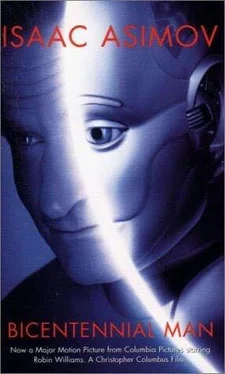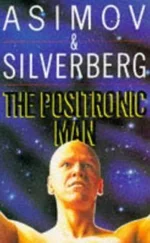Funarelli made a throwing gesture, or the beginning of one, and a look of agony came over his face. “Can I jump to the Sun?” he said.
“I’ll go out and throw some. . . . The suit seems to check out. Maybe I can throw some into the hole. . . . I hope the air lock operates.”
“Can we spare the air?” said Funarelli anxiously.
“Will it matter in two weeks?” said Estes wearily.
Every astro-miner has to get outside the ship occasionally—to carry out some repair, to bring in some chunk of matter in the vicinity. Ordinarily, it’s an exciting time. In any case, it’s a change.
Estes felt little excitement, only a vast anxiety. His notion was so damned primitive, he felt foolish to have it. It was bad enough dying without having to die a damn fool.
He found himself in the black of space, with the glittering stars he had seen a hundred times before. Now, though, in the faint reflection of the small and distant Sun, there was the dim glow of hundreds of bits of rock that must once have been part of an asteroid and that now formed a tiny Saturn’s ring about a black hole. The rocks seemed almost motionless, as all drifted along with the ship.
Estes judged the direction of wheel of the stars and knew that ship and rocks were moving slowly in the other direction. If he could throw a rock in the direction of the star motion, he would neutralize some of the rock’s velocity relative to the black hole. If he neutralized not enough of the velocity, or too much, the rock would drop toward the hole, skim about it, and come back to the point it had left. If he neutralized just enough, it would come close enough to be powdered by the tidal effect. The grains of powder, in their motions, would slow each other and spiral into the hole, releasing X rays as they did so.
Estes used his miner’s net of tantalum steel to gather rocks, choosing them fist size. He was thankful that modern suits allowed complete freedom of motion and were not the virtual coffins they had been when the first astronauts, over a century ago, had reached the Moon.
Once he had enough rocks, he threw one, and he could see it glimmer and fade in the sunlight as it dropped toward the hole. He waited and nothing happened. He didn’t know how long it might take to fall into the black hole—if it fell in at all, that is—but he counted six hundred to himself and threw again.
Over and over he did so, with a terrible patience born of searching for an alternative to death, and finally there was a sudden blaze in the direction of the black hole. Visible light and, he knew, a burst of higher-energy radiation as far as X rays at least.
He had to stop to gather more rocks, and then he got the range. He was hitting it almost every time. He oriented himself so that the soft glimmer of the black hole would be seen just above the midportion of the ship. That was one relationship that didn’t change as the ship circled and rolled on an axis-or changed least.
Even allowing for his care, however, it seemed to him he was making too many strikes. The black hole, he thought, was more massive than he knew and would swallow up its prey from a larger distance. That made it more dangerous, but increased their chance of rescue.
He worked his way through the lock and back into the ship. He was bone-weary and his right shoulder hurt him.
Funarelli helped him off with the suit. “That was terrific. You were throwing rocks into the black hole.”
Estes nodded. “Yes, and I’m hoping my suit has been stopping the X rays. I’d just as soon not die of radiation poisoning.”
“They’ll see this back on Earth, won’t they?”
“I’m sure they will,” said Estes, “but will they pay attention? They’ll record it all and wonder about it. But what’s going to make them come out here for a closer look? I’ve got to work out something that will make them come, after I have just a little time to rest.”
An hour later, he lifted out another space suit. No time to wait for the recharge of the solar batteries in the first one. He said, “I hope I haven’t lost the range.”
He was out again, and it had become clear that even allowing a fairly wide spread of velocities and direction, the black hole would suck up the slowing rocks as they moved inward.
Estes gathered as many rocks as he could manage and placed them carefully on an indentation in the hull of the ship. They didn’t stay there, but they drifted only exceedingly slowly, and even after Estes had collected all he could, those he had placed there first had spread out no more than billiard balls on a pool table.
Then he threw them, at first tensely, and then with growing confidence, and the black hole flashed—and flashed—and flashed.
It seemed to him that the target became steadily easier to hit and that the black hole was growing madly with each impact and that soon it would reach out and suck him and the ship into its never-sated maw.
It was his imagination, of course, and nothing more. Finally all the rocks were gone and he felt he could throw nothing more in any case. He had been out there, it seemed, for hours.
When he was within the ship again he said, as soon as Funarelli had helped him off with his helmet, “That’s it. I can’t do anything more.”
“You had plenty of flashes there,” said Funarelli.
“Plenty, and they should surely be recorded. We’ll just have to wait now. They’ve got to come.”
Funarelli helped him off with the rest of his suit as best his muscle-torn body would allow. Then he stood, grunting and gasping, and said, “Do you really think they’ll come, Ben?”
“I think they’ve got to,” said Estes, almost as though he were trying to force the event by the sheer power of wishing. “I think they’ve got to.”
“Why do you think they’ve got to?” said Funarelli, sounding like a man who wanted to grasp at straws but didn’t dare.
“Because I communicated,” said Estes. “We’re not only the first people to encounter a black hole, we’re the first to use it to communicate; we’re the first to use the ultimate communication system of the future, the one that might send messages from star to star and galaxy to galaxy, and that might be the ultimate energy source as well—” He was panting, and he sounded a little wild.
“What are you talking about?” said Funarelli.
“I threw those rocks in rhythm, Harv,” said Estes, “and the X-ray bursts came in rhythm. It was flash-flash-flash-flash-flash-flash-flash-flash-flash, and so on.”
“Yes?”
“It’s old-fashioned; old-fashioned, but that’s one thing everyone remembers from the days when people communicated by electric currents running through wires.”
“You mean the photograph—phonograph—”
“The telegraph, Harv. Those flashes I produced will be recorded and the first time someone looks at that record, all hell will break loose. It’s not just that they’ll be spotting an X-ray source; it’s not just that it will be an X-ray source moving very slowly against the stars so that it has to be within our Solar System. What it is, is that they’ll be seeing an X-ray source going on and off and producing the signal sos—sos—And when an X-ray Source is shouting for help, you’ll bet they’ll come—as fast as they can—if only to see—what’s—there—that—”
He was asleep.
— And five days later, a drone ship arrived.
***
Incidentally, it may occur to some of my Gentle Readers that there is a certain similarity between the story and my very first published story, MAROONED OFF VESTA, which appeared in print thirty-seven years earlier. In each story, two men are trapped on a spaceship wrecked in the asteroid belt and must use their ingenuity to devise a way of escaping what looked like certain death.
Читать дальше












